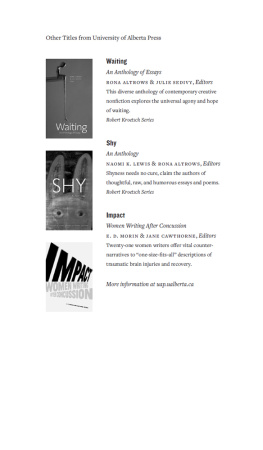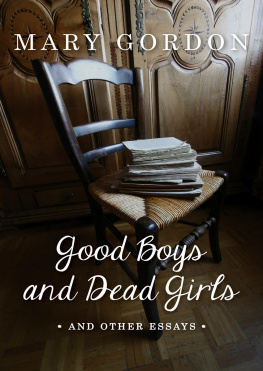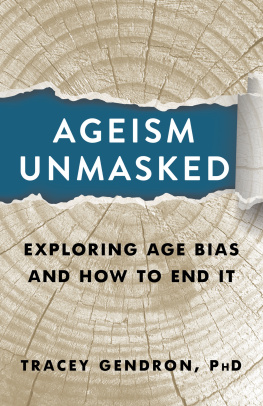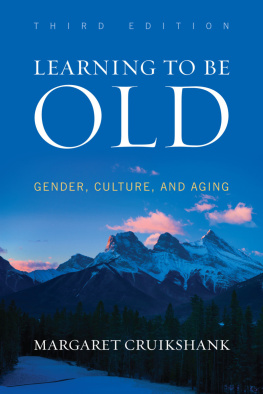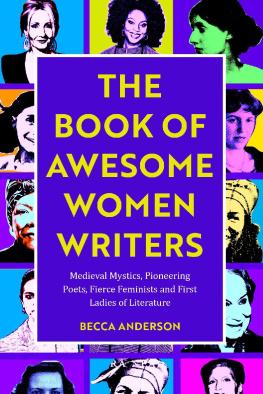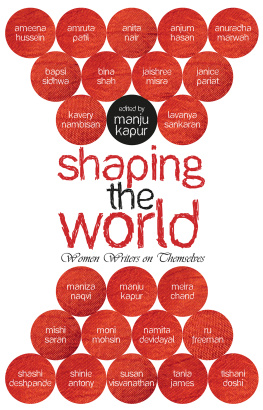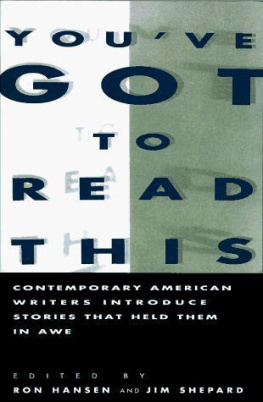Table of Contents

Published by
University of Alberta Press
116 Rutherford Library South
11204 89 Avenue NW
Edmonton, Alberta, Canada T6G 2J4
uap.ualberta.ca
Copyright 2021 University of Alberta Press
LIBRARY AND ARCHIVES CANADA CATALOGUING IN PUBLICATION
Title: You look good for your age : an anthology / Rona Altrows, editor.
Names: Altrows, Rona, 1948 editor.
Series: Robert Kroetsch series.
Description: Series statement: Robert Kroetsch series
Identifiers: Canadiana (print) 20200324667 |Canadiana (ebook) 20200324721 | ISBN 9781772125320 (softcover) | ISBN 9781772125733 (PDF)
Subjects: LCSH: Aging in literature. | LCSH: Older women in literature. | LCSH: Women in literature. | CSH: Canadian literature (English)Women authors. | CSH: Canadian literature (English)21st century.
Classification: LCC ps8235.w6 y68 2021 | DDC c810.8/035246dc23
First edition, rst printing, 2021.
First electronic edition, 2021.
Digital conversion by Transforma Pvt. Ltd.
Copyediting and proofreading by Meaghan Craven.
Cover design by Alan Brownoff.
A volume in the Robert Kroetsch Series.
Cover image: Rosa Luetchford, Debbie, 2018. Oil on canvas, 120 cm. 140 cm. Used by permission
All rights reserved. No part of this publication may be produced, stored in a retrieval system, or transmitted in any form or by any means (electronic, mechanical, photocopying, recording, or otherwise) without prior written consent. Contact University of Alberta Press for further details.
University of Alberta Press supports copyright. Copyright fuels creativity, encourages diverse voices, promotes free speech, and creates a vibrant culture. Thank you for buying an authorized edition of this book and for complying with the copyright laws by not reproducing, scanning, or distributing any part of it in any form without permission. You are supporting writers and allowing University of Alberta Press to continue to publish books for every reader.
University of Alberta Press gratefully acknowledges the support received for its publishing program from the Government of Canada, the Canada Council for the Arts, and the Government of Alberta through the Alberta Media Fund.
This work is published with the assistance of the Western Canadiana Publications Endowment.

For my contributors
Contents
SHARON BUTALA
ARIEL GORDON
MAUREEN BUSH
JOY KOGAWA
WENDY MCGRATH
LAURIE MACFAYDEN
ANNE SORBIE
ELIZABETH HAYNES
ROBERTA REES
OLYN OZBICK
DEBBIE BATEMAN
ELIZABETH GREENE
LAURIE MACFAYDEN
JOANN MCCAIG
WENDY MCGRATH
CECELIA FREY
VIVIAN HANSEN
DEBBIE BATEMAN
LISA MURPHY LAMB
JOAN CRATE
RONA ALTROWS
JULIE SEDIVY
MONI BRAR
LAURA WERSHLER
MADELAINE SHAW-WONG
DORA DUECK
PAULA E. KIRMAN
JANE CAWTHORNE
JOAN CRATE
ARITHA VAN HERK
MONI BRAR
LORRI NEILSEN GLENN
E. D. MORIN
JOYCE HARRIES
Preface
THIS IS A BOOK about women, aging, and ageism. There are twenty-nine contributing writers, and we range in age from our nineties down to our forties. We all identify as female.
The idea for the book arose from my own life. In September 2018, I was diagnosed with obstructive sleep apnea and it was recommended that I get fitted for a device. A young respiratory therapist, seeing me for the first time, looked at my medical chart, which of course included date of birth, then scrutinized my face. You look good for your age, she said. Inwardly, I was angry. But why? I mulled over my internal reaction for a while and figured out that the respiratory therapists clichd comment, while intended as a compliment, carried with it the social assumption that it is better to look young than old and, by logical extension, better to be young than old. Otherwise, the qualifier for your age would not be necessary.
Why are these assumptions made? What effects do they have on aging women? What messages about the aging process do we pass on to our daughters? Are those messages healthy? Or, as an aging woman, am I simply not willing to face up to the fact that when I see myself in the mirror, I am less satisfied than I used to be? And am I ashamed of feeling that way?
The questions just kept coming. And it struck me that I was not the only one asking them. So many women have aging on their minds. How can we not? The older we get, the more we find ourselves surrounded by ageist messaging, ghosted, relegated to invisibleness. In fact, women start having to deal with issues related to aging and ageism as early as in our forties.
It seemed to me the best way to explore those questions, and other questions I might well not have thought of, was to put together an anthology. So I invited some other professional writers who identify as female to send me their thoughts, using whatever creative forms they wished. Send they did, beautiful pieces with so many distinct views, impressions, and speculations on aging and ageism and their own growth as people.
This is our book. Serious, whimsical, satirical, angry, and impressionistic works all have a place in You Look Good for Your Age . The book contains the work of writers from varying backgrounds. Some come from communities involved in historicaland, unfortunately, currentfights for human rights: queer, Mtis, immigrant, Jewish. Some struggle with mental health challenges such as anxiety, depression, panic disorder. What we all share is a belief in the essential value of women, the aging process, mutual respect.
The book is organized in thematic parts, there is a lot of overlap in themes, and each piece deals with multiple matters. We do not claim to cover every aspect of aging and ageism. These are takes on the subject. Since life imitates art imitates life ad infinitum , we have made it clear which prose pieces are fiction and which are nonfiction. Poetry also occupies an important place.
In INSIGHT , writers deal with vision versus eyesight, a changing approach to fear, the age-irrelevancy of meditation, the intent to forgive, the poetic possibilities of an empty nest, a floral perspective on the self.
ELDERS explores a daughters parenting of parents with dementia, a daughters learnings from a nonagenarian mother who continues to pursue her love of nature, a daughters thoughts on the fierce love and complexity of a mother who has just died, an imagined social media page, a poets recollections of the older women in her family, as experienced by her in adolescence.
BODY invites us to consider anti-aging Internet ads, the mature womans care and treatment of hemorrhoids, the psychological benefits and perils of life in the gym, the aging womans changing relationship with blood.
LOVE explores a married womans affair that surprises the woman herself, the maddening proximity of an unattainable love, the fear of imminent loss of a long-time love, the convoluted path from alienation to self-love.
TIMELINES takes us to reflections and stories about the present and past self, the self and younger women, the shattered promise of a good life in a new town, the pain of losing a cherished friend. A woman in her forties looks at how she got to where she is; a woman in her fifties gazes forward and back, back and forward. A poet rejoices in the joys of dressing for comfort and reassuring smells.
We end the book with ENOUGH ! In this part, writers deal with some common assumptions about women and aging (we should be infinitely patient, we should have grandchildren, we should shut up, et cetera) and say what they think about those assumptions.

